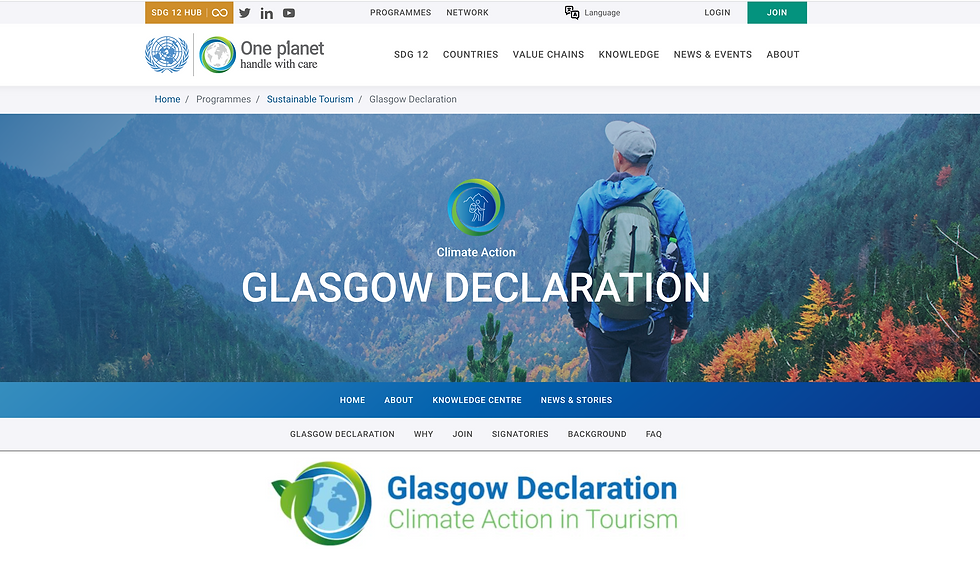COP26: What You Need to Know about the Glasgow Declaration on Climate Action in Tourism
- Emily Goldfischer
- Nov 1, 2021
- 4 min read
With COP26 taking place over the next two weeks (through November 12) in Glasgow, Scotland hertelier will be covering the highlights of initiatives related to tourism and hotels coming out of the conference, as well as spotlighting sustainability in the sector.
What you need to know: COP26, stands for the 26th "Conference of the Parties" and represents a gathering of the near 200 countries signed on to the U.N. Framework Convention on Climate Change (UNFCCC) and the Paris Climate Agreement, which happened in 2015, setting a goal to limit global warming to well below 2˚C, preferably 1.5˚C compared to pre-industrial levels. In the same year, 193 nations committed to the United Nations Sustainable Development Goals – 17 interlinked global goals designed to achieve a better and more sustainable future for all. The UNFCCC meets every year to discuss progress on the fight against climate change, and negotiate how to fulfill the terms of climate agreements, and has been doing it since 1995 (hence COP26).
What's new? It's getting hotter, faster than the experts predicted, so the stakes are high for COP26. In August of this year, the UN released a "dire report" that the UN Secretary-General António Guterres called "a code red for humanity." He noted that the internationally-agreed threshold of 1.5 degrees above pre-industrial levels of global heating is "perilously close and the only way to prevent exceeding this threshold is by urgently stepping up our efforts."
How much does the tourism sector impact climate change? According to the United Nations World Tourism Organization (UNWTO), "tourism is highly vulnerable to climate change and at the same time contributes to the emission of greenhouse gases (GHG), which cause global warming."
What does cutting emissions look like? The COVID-19 pandemic has led to a 7% reduction of GHG emissions globally in 2020, offering a real reference to what actually needs to be done to achieve the goals of the Paris Agreement, which requires the same annual (around 7%) reduction of emissions throughout the next decade, according to a UN report from 2019. This is especially daunting as according to UNWTO/ITF data, tourism CO2 emissions grew at least 60% from 2005 to 2016, with transport-related CO2 causing 5% of global emissions in 2016, and CO2 emissions from tourism are forecasted to increase by 25% by 2030 from 2016 levels.
Needless to say, as an industry, the urgency to scale up climate action in tourism is upon us. The future resilience of tourism will depend on the sector’s ability to embrace a low carbon pathway and cut emissions by 50% by 2030, according to the UNWTO.
What is the next step for travel? The UNFCCC and the UNWTO are asking global travel and tourism sector leaders—to sign and commit to the Glasgow Declaration on Climate Action in Tourism.
The aim of the Glasgow Declaration on Climate Action in Tourism is to support the UN in achieving its previously stated goal of cutting greenhouse gas emissions in half by the year 2030 and achieving ‘Net Zero’ before 2050. By committing to halving carbon emissions by the end of this decade, the travel industry would be aligning itself with the broader ‘Race to Zero’ campaign across the whole global economy.
To ensure climate action is aligned across all of tourism, the Glasgow Declaration asks companies to commit to five shared actions:
MEASURE Measure and disclose all travel and tourism-related emissions using transparent UNFCCC guidelines on measurement, reporting, and verification.
DECARBONISE Set and deliver decarbonization targets across transport, infrastructure, accommodation, activities, food & drink, and waste management, with carbon offsetting playing a subsidiary role.
REGENERATE Restore and protect ecosystems, safeguard biodiversity, food security, and water supply, with a specific responsibility to support affected and at-risk communities with resilience building, adaptation, and disaster response.
COLLABORATE Share risks and solutions to ensure that collective plans are as effective and coordinated as possible across all levels, including national and sub-national authorities, large companies, and SMEs, vulnerable groups, local communities, and visitors.
FINANCE Ensure financial resources and organizational capacity are sufficient to support training, research, and implementation of effective fiscal and policy tools, in order to meet shared climate plan objectives.
While the Glasgow Declaration will certainly put a more formal and accountable structure in place, the industry has started to organize itself. A few key initiatives, which have already drawn participation from organizations across the sector to know about:

ItMustBeNow.com, a legacy project created and launched by industry stalwarts Onno and Alexa Poortier, in 2017. A useful portal for both hoteliers and travelers, offering tools for measurement, carbon offset, and a place for travelers to find hotels that are meeting climate objectives.
Travalyst, launched by the Duke of Sussex (aka Prince Harry) in 2019, has some of the biggest names in the industry signed on including Booking.com, Google, Skyscanner, Trip.com Group, Tripadvisor, and Visa.
Tourism Declares a Climate Emergency, founded in 2020, has signed up companies ranging from accommodation to DMCs and tour operators.
UNWTO is the travel arm of the United Nations, this is where you can find the latest information and research.
.png)

